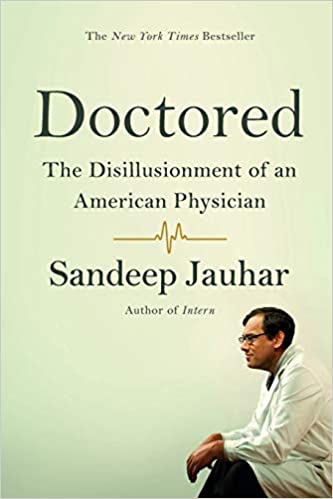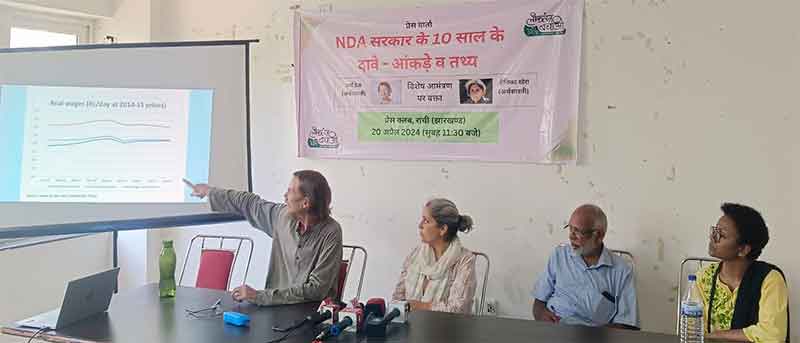
In the course of facing the ongoing challenge of the pandemic, a sad reality that has manifested itself time and again is that profit-driven health systems are unable to respond effectively to such crisis situations. There are several disturbing anecdotes of how the profit driven systems and the individuals running them behaved in a selfish and callous way towards patients. These anecdotes get talked about and disturb us a lot, but in reality these are only the more obvious manifestation of more widely pervasive and deeper problems which may be causing a lot of problems and distortions even in normal times without attracting much criticism because these distortions have been ‘normalized’ in the system. It is very important to recognize this as a systems problem and not just as sporadic manifestations, as without such recognition and understanding it is not possible to bring the necessary reforms.
Another important aspect of this problem is that if such a distorted system exists in a very rich country, some of its ill-effects can be checked because a lot of funds are available. However when some poorer countries try to copy parts of this system, or else pressures are exerted on them to do so, then these countries are unlikely to have the funds to check these ill effects. Hence much more harmful impacts may result. Hence it is even more important in these countries to recognize and understand these distortions and to avoid them. It is in this wider context that careful study and documentation of profit-driven health systems has a very important role.
The USA health system is regarded as a very important example of a profit-driven health system and some important and useful studies of the distortions that exist here have emerged in recent years. However the book being discussed here has a very special relevance in this literature. This book titled Doctored – The Disillusionment of an American Physician’ has been written by Dr. Sandeep Jauhar and published by Farrar, Straus and Giroux, New York. Dr. Jauhar has been the Director of the Heart Failure Program at a leading US hospital and has also written regularly for the New York Times.
The special relevance of this book is that the author is not at all ideologically or otherwise a critic of the system to start with. In fact he is very eager to succeed in this system and to serve it well and he is willing to work very hard for this. One may say that he is very keen to succeed within the system as it is, he is obviously a talented and bright professional and he is willing to give his best to make the system work and to succeed. But he is also basically a very honest person at heart and he is troubled when he sees wrongdoing.
He has a strong sense of ethics and would like to go by it , even though he is also keen to be a success. If in the process of his routine work or on the road to success, he sees a violation of ethics which will obviously harm someone sooner or later, directly or indirectly, he is troubled and tries to avoid violation of ethics if he can. What happens then? This is useful to learn from the book. As he sees these problems around him, he also studies and finds out some wider problems, or data relating to this, which he shares with readers. So as he goes by understanding the system he has joined with high hopes, he shares his feelings with the reader and the reader joins in his discovery and understanding of the less pleasant realities of the generally brightly portrayed heath system of the richest country in the world.
In this book Dr. Jauhar has portrayed a highly commercialized system in which doctors who want to be honest to their profession feel very helpless and hence are exposed to high levels of depression. In a survey of 12,000 physicians, only 6 per cent described their morale as positive! The majority of them said they did not have enough time to spend with their patients because of paperwork. In the USA, among professions, physicians have the highest suicide rate. One American doctor kills himself (or herself) every day.
One doctor said on Sermo, the online community of more than 1,25,000 physicians, “Working up patients in the ER these days involves shortgunning multiple unnecessary tests (everybody gets a CT!) despite the fact that we know they don’t need them, and becoming aware of the wastefulness of it all really sucks the love out of what you do. I feel like a pawn in a money-making game for hospital administrators.”
Another doctor quoted in this book says, “You’re doing things, and you’re doing them because you’ve got to be doing them, but you’ve thinking, why the hell am I doing this?”
One doctor regrets, “We allowed the insurance companies to come between us and our patients.”
Dr. Jauhar says, “Year after year, health care spending grew faster than the economy as a whole. Premiums for insurers like Blue Cross, whose reimbursement rates were determined by doctors, increased 25 to 50 per cent annually. Meanwhile reports of waste and fraud were rampant.”
A Congressional investigation found that surgeons performed 2.4 million unnecessary operations resulting in nearly 12,000 deaths.
The Institute of Medicine estimated that wasteful health spreading (that does not improve health outcomes) costs $750 billion in the USA every year.
A study published in the England Journal of Medicine found that one in five Medicare patients discharged from the hospital was readmitted within a month. One in three was readmitted within three months.
Dr. Donald Berwick and Dr. Allan Detsky wrote in the Journal of American Medical Association that inpatient care at teaching hospitals has become a relay race for physicians and consultants, and patients are the batons.
Researchers have found that a doctor who owns a nuclear scanner is seven times as likely as other doctors to call for a scan. Between 1987 and 2006 the exposure of Americans to radiation increased by seven times, primarily because of CT scans. The number of CT scans in the USA in one year is around 70 million.
Patients are overexposed to a battery of specialists, several of whom they do not need, while the doctor who knows a patient best is often not involved in her or his care at the time of hospitalization. Dr. Jauhar gives one example, “A fifty-year old patient of Oni’s was admitted to the hospital with shortness of breath. During his month-long stay, which probably cost upward of $200,000, he was seen by a hematologist; an endocrinologist; a kidney specialist; a podiatrist; two cardiologists, a cardiac electrophysiologist; an infectious-diseases specialist; a pulmonologist; an ear, nose and throat specialist; a urologist; a gastroenterologist; a neurologist, a nutritionist; a general surgeon; a thoracic surgeon; and a pain specialist. The man underwent twelve procedures, including cardiac catheterization, a pacemaker implant, and a bone marrow biopsy (to work up mild chronic anemia). … When he was discharged (with only minimal improvement in his shortness of breath), follow-up visits were scheduled for him with seven specialists.”
Dr. Jauhar comments, “Patients don’t always require specialists. Patients often have “overlap syndromes” (we used to call it aging), which cannot be compartmentalized into individual problems and are probably best managed by a good general physician. When specialists are called in, they are opt to view each problem through the lens of their specific organ expertise. Patents generally end up worse- I have seen it over and over again.”
Medicare imposed a requirement that antibiotics be administered to a pneumonia patient within 6 hours of arriving at the hospital. Doctors often cannot diagnose pneumonia so quickly, but because of Medicare requirement antibiotics were given despite all-too-evident dangers to patients.
Introduction of surgical report cards which rewarded lower mortality led to a strong tendency to avoid more serious patients. As a research report stated, “Mandatory reporting mechanism inevitably gives providers the incentive to decline to treat more difficult and complicated patients. …Observed mortality declined as a result of a shift in incidence of surgeries towards healthier patients.”
In New York state 63 per cent of cardiac surgeons acknowledged that because of report cards, they were accepting only relatively healthy patients for heart bypass surgery. 59 per cent of cardiologists said it had become harder to find a surgeon to operate on their most severely ill patients.
Despite very high spending on health the USA lags behind in health achievements. According to the Commonwealth Fund, a health care research group, the US ranks forty-fifth in life expectancy (behind Bosnia and Jordan). Among developed countries, it is almost at the bottom of the list when it comes to reducing infant mortality. Similarly it is near the last place in terms of health care quality access and efficiency.
What is more, as Dr. Jauhar tells us, “…within the USA, regions that spend the most on health care appear to have higher mortality rates than regions that spend the less, perhaps because of increasing hospitalization rates that result in more life-threatening errors and infections.”
Dr. Jauhar concludes, “I am convinced of one thing; the vast majority of doctors aren’t bad. It is the system that makes us bad, makes us make mistakes.” He says that more doctors are willing to stay till late and provide good care, but “they are struggling to do so in a system that is diseased.” The most disturbing part of what Dr. Jauhar says is that most doctors realise that the system is forcing them into a situation in which they cannot be honest to their profession, yet feel so trapped by the system that they can’t resist it enough to find the honest way out.
It is these words of the system being diseased which are most important and convey the wider grim reality. It is not a question so much of criticizing any individual doctor’s actions but what is much more important is that a truly honest and ethical doctor finds it so difficult to work within the system without making compromises with which his conscience does not really agree and which leave an uneasy feeling. To his great credit, Dr. Jauhar is so frank with his readers that he does not hesitate to tell how he and his own family members are also driven to make some compromises with differing levels of willingness ( or reluctance) and the frank discussions that take place among doctors in which any initial reluctance to make such compromises is ridiculed and frowned upon. We see situations in which trying to work honestly and with ethics is fraught with difficulties while compromises which involve ethical violations make it easy to work and join the road to career and economic gains as well. In other words it is much easier to be dishonest ( up to a level) than to be honest in this system. It a system in which there is more reluctance to treat patients in more difficult conditions and more eagerness to take up relatively healthy patients and to expose them to a number of unnecessary specialist treatments and tests!
At this stage I would like to leave Dr. Jauhar ( as his account was written before COVID-19) and raise a question which is relevant to more recent times—how would such a profit-driven system respond to the new and increased challenges of a pandemic? Will it respond in a most honest and rational way that is needed? Isn’t honesty ( or full freedom from monetary and financial aspects while taking a decision concerning welfare of people) related to the rationality of the response?
All these aspects are even more relevant in poorer and developing countries where there is a tendency to bring in aspects of the same profit driven system, driven by same or similar narrow interests. In India for example we see a clear trend with emphasis shifting from public to private health care, and from basic health care for all to insurance based systems, ie from providing health care to buying health care. Here also we see increasing and sometimes shocking commercialization of health system, from medical education to actual treatment, and the growing distress of the idealists who want to serve honestly and who want to prioritize serving the poor and the neglected people in rural areas. Clearly there is a clear case for systems reform, here as well in the richest countries like the USA.
Bharat Dogra is a journalist and author. His recent books include Man Over Machine ( Gandhian ideas for our times) and Protecting Earth for Children.
GET COUNTERCURRENTS DAILY NEWSLETTER STRAIGHT TO YOUR INBOX















































